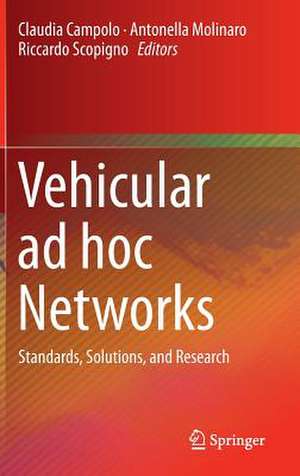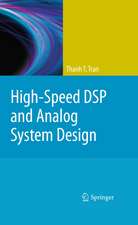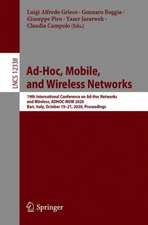Vehicular ad hoc Networks: Standards, Solutions, and Research
Editat de Claudia Campolo, Antonella Molinaro, Riccardo Scopignoen Limba Engleză Hardback – 10 iun 2015
Preț: 1126.52 lei
Preț vechi: 1373.81 lei
-18% Nou
Puncte Express: 1690
Preț estimativ în valută:
215.58€ • 234.09$ • 181.09£
215.58€ • 234.09$ • 181.09£
Carte tipărită la comandă
Livrare economică 22 aprilie-06 mai
Preluare comenzi: 021 569.72.76
Specificații
ISBN-13: 9783319154961
ISBN-10: 3319154966
Pagini: 530
Ilustrații: XII, 544 p. 200 illus., 77 illus. in color.
Dimensiuni: 155 x 235 x 27 mm
Greutate: 0.95 kg
Ediția:2015
Editura: Springer International Publishing
Colecția Springer
Locul publicării:Cham, Switzerland
ISBN-10: 3319154966
Pagini: 530
Ilustrații: XII, 544 p. 200 illus., 77 illus. in color.
Dimensiuni: 155 x 235 x 27 mm
Greutate: 0.95 kg
Ediția:2015
Editura: Springer International Publishing
Colecția Springer
Locul publicării:Cham, Switzerland
Public țintă
Professional/practitionerCuprins
Part I Overall architecture, physical and MAC layers of VANETs.- Fundamentals of vehicular communications.- PHY-MAC Standards for VANETs.- Decentralized congestion control techniques for VANETs.- Alternative & complementary solutions to 11p TDMA-based approaches.- Part II Network and Application layers of VANETs.- Main messages for safety: BSM, CAM, DENM.- Multi-channel architecture: ETSI vs. IEEE.- Geo-routing: media dependent and media-independent.- IPv6 and VANET protocol stack.- Privacy in VANETs.- Emerging applications.- Part III Research and working tools for VANETs.- Mobility Models.- Network simulators.- Performance indicators for VANETs protocols.- Preliminary test-beds and deployment plans.
Notă biografică
Claudia Campolo is an Assistant Professor of Telecommunications University Mediterranea of Reggio Calabria, Italy Antonella Molinaro is an Associate Professor of Telecommunications University Mediterranea of Reggio Calabria, Italy Riccardo Scopigno is the Head of Multi-Layer Wireless Solutions (MLW) Research Area Istituto Superiore Mario Boella (ISMB), Torino, Italy.
Textul de pe ultima copertă
This book presents vehicular ad-hoc networks (VANETs) from the their onset, gradually going into technical details, providing a clear understanding of both theoretical foundations and more practical investigation. The editors gathered top-ranking authors to provide comprehensiveness and timely content; the invited authors were carefully selected from a list of who’s who in the respective field of interest: there are as many from Academia as from Standardization and Industry sectors from around the world. The covered topics are organized around five Parts starting from an historical overview of vehicular communications and standardization/harmonization activities (Part I), then progressing to the theoretical foundations of VANETs and a description of the day-one standard-compliant solutions (Part II), hence going into details of vehicular networking and security (Part III) and to the tools to study VANETs, from mobility and channel models, to network simulators and field trial methodologies (Part IV), and finally looking into the future of VANETs by investigating alternative, complementary communication technologies, innovative networking paradigms and visionary applications (Part V). The way the content is organized, with a differentiated level of technical details, makes the book a valuable reference for a large pool of target readers ranging from undergraduate, graduate and PhD students, to wireless scientists and engineers, to service providers and stakeholders in the automotive, ITS, ICT sectors.
Caracteristici
Examines both ETSI and IEEE standard solutions, highlighting their differences and historical evolution and convergence
Assesses possible complementary/competing technologies, such as LTE, for the delivery of a more complete solution - highlighting points of strength and weaknesses
Includes research on approaches, results and tools for analysis
Assesses possible complementary/competing technologies, such as LTE, for the delivery of a more complete solution - highlighting points of strength and weaknesses
Includes research on approaches, results and tools for analysis





























